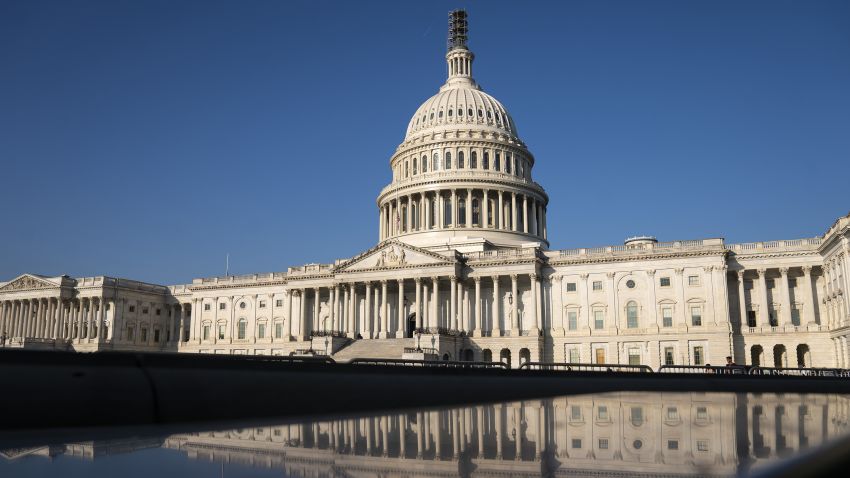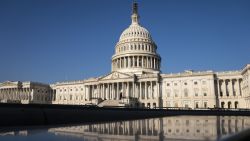While events on the other side of the world – and the other end of the US Capitol – have dominated recent news, the race for control of the Senate is a crucial factor in what Washington could look like after next year’s elections.
The 2024 Senate map is advantageous for Republicans as they try to pick up the one or two seats needed to flip the chamber, depending on who wins the White House next year. Members of the Senate Democratic Caucus are defending the most competitive seats – the top eight on this list of 10 seats most likely to flip – which is not likely to change ahead of November 2024.
The order of the ranking, however, is changing. (Rankings are based on CNN’s reporting, fundraising figures and historical data about how states and candidates have performed.) Pennsylvania, for example, shoots up from No. 7 in July to No. 4 this month – in large part because it’s the one battleground where Republicans aren’t facing a messy primary.
GOP candidate fields elsewhere have only grown over the past couple of months, despite the National Republican Senatorial Committee’s new policy of taking sides in primaries. Besides Pennsylvania, the national party has made its preference known for specific candidates in West Virginia, Montana, Nevada and Michigan. The NRSC is neutral in Ohio’s crowded primary and hasn’t ruled out endorsing in Arizona.
Whether engaging in primaries early on will pay off remains to be seen. So far, however, NRSC Chairman Steve Daines’ tactic of keeping Donald Trump close appears to be working, as the former president hasn’t yet endorsed against any of the campaign committee’s picks.
The GOP presidential front-runner – with his four criminal indictments – is likely to be a liability in some places next year if he is the party’s nominee. But Republicans take comfort in the fact that he won the top three states on this list handily in 2020 and red-state Democrats will have to run with an unpopular President Joe Biden atop the ticket. In an era of increasingly nationalized politics, it’s becoming harder to run for Senate in a state that voted for the opposite party’s presidential nominee. In Democrats’ favor, however, Sens. Joe Manchin of West Virginia, Jon Tester of Montana and Sherrod Brown of Ohio have succeeded at it before.
Vulnerable Democratic senators will try to distance themselves from Biden where they can or try to signal that they represent a check on the White House. For example, six of them (plus independent Sen. Kyrsten Sinema, who caucuses with Democrats) recently joined a bipartisan call to the secretary of state to freeze $6 billion in Iranian assets after Hamas’ attack on Israel – even though the administration has made clear that the money hasn’t been touched, has strict restrictions around it and the US hasn’t found a direct link between Iran and the Hamas attack.
It’s too early to say whether current events – especially abroad – could have any impact on elections that are still over a year away, but with the GOP-led House paralyzed without a speaker and Congress being called upon to approve aid to Israel and Ukraine, the moment has underscored how congressional contests have very real consequences.
Here’s where things stand in the race for the Senate just over a year before Election Day 2024:
1. West Virginia
Incumbent: Democrat Joe Manchin
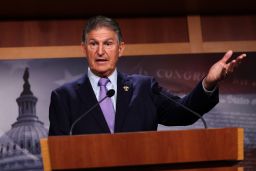
West Virginia remains the seat most likely to change party hands next year, whatever Sen. Joe Manchin does. The most conservative Democrat in the Senate – who hasn’t ruled out running as an independent for reelection or for president – Manchin isn’t expected to announce his plans until the end of this year. He raised $715,000 in the July-to-September third quarter – enough to maintain appearances that he’ll be a candidate next year. The haul is also more than what either of his major GOP opponents raised but about half a million less than his previous quarter total. (The chances of this seat flipping only go up if Manchin declines to seek a third full term.)
Even if he runs without the “D” after his name, he’ll have an uphill battle in a state Trump won by 39 points in 2020. His vulnerability is apparent in the way GOP-affiliated ads are tying him to Biden and Democratic-aligned spots are tying him to Trump. One Nation, for example, has attacked him over his support of Biden’s Inflation Reduction Act, while Duty and Honor PAC has touted Manchin’s work with Trump to protect miners’ pensions.
The immediate fight, however, is the GOP primary, where Jim Justice, the popular Democrat-turned-Republican governor, has outraised Rep. Alex Mooney by about $300,000. While national Republicans and Trump are behind Justice, the Club for Growth and an allied super PAC have committed nearly $13.6 million to the House Freedom Caucus member. The club’s political arm is airing ads calling Justice a RINO, or Republican in Name Only, and trying to tie him to Senate GOP leader Mitch McConnell.
2. Montana
Incumbent: Democrat Jon Tester
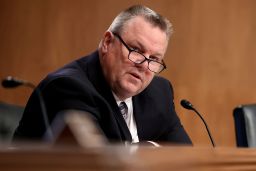
Sen. Jon Tester, another red-state Democrat, is no stranger to tough races. But the most pressing question is whether GOP Rep. Matt Rosendale – fresh off his vote to oust House Speaker Kevin McCarthy – decides to complicate national Republicans’ plans by mounting his own bid to avenge his 2018 loss to Tester. The NRSC likes retired Navy SEAL Tim Sheehy, who already has the backing of the two other members of Montana’s congressional delegation (including Daines, the NRSC chairman) and Gov. Greg Gianforte. Sheehy, who entered the race in July, raised $2.9 million in the most recent fundraising quarter (including about $653,000 in personal money), but he’s a relative newcomer. (The Minnesota native has taken heat, for example, for saying in a Breitbart News interview that there were more bears than people in Montana.)
Rosendale, too, has out-of-state roots, and his House campaign only brought in about $335,000 during the third quarter. But as a previous statewide candidate – he was elected state auditor in 2016 and lost to Tester by about 4 points in 2018 – he starts with more built-in name recognition than Sheehy and could potentially benefit from assistance from the Club for Growth. Sheehy has been on air trying to introduce himself, leaning heavily into his military service and using ranching motifs to highlight his ties to the state. He’s also been attacking Tester for not adhering to some of the commitments in an ethics pledge he ran on during his first campaign, as CNN’s KFile reported.
An outside group called Last Best Place PAC, seemingly linked to Democrats, is attacking Sheehy – a sign Democrats may think he’d be a tougher opponent than Rosendale. Tester appears to be taking the race seriously – he raised more than $5 million in the third quarter and ended September with $13 million.
3. Ohio
Incumbent: Democrat Sherrod Brown
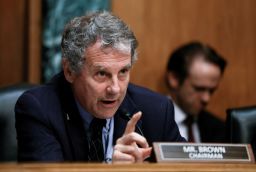
Democratic Sen. Sherrod Brown is gearing up for a tough race in a state that’s been trending red over the past decade. (He raised $5.8 million in the third quarter, ending the period with $11.2 million.) He’ll need all the money he can get if he faces one of the two self-funders vying for the GOP nomination. Both businessman Bernie Moreno and state Sen. Matt Dolan loaned their campaigns $3 million in the third quarter. Secretary of State Frank LaRose – who raised about $1 million, including $250,000 he loaned his campaign – doesn’t have the same kinds of personal resources, but he likely starts with a name ID advantage as the only statewide elected official in the GOP race. He became the public face of an August ballot effort to raise the threshold for amending the state constitution – seen as a proxy fight over an upcoming November referendum on abortion rights. LaRose admitted the measure was effectively about abortion, so the effort’s failure has been a point of attack from his primary opponents.
Trump carried Ohio twice, and his backing proved instrumental in getting now-Sen. JD Vance over the finish line in last year’s Republican primary, which also featured Dolan and, briefly, Moreno. Vance is backing Moreno in this primary, and while Trump has praised Moreno, he hasn’t made any endorsement yet. The NRSC is so far staying neutral in this race. The candidates met for their first forum last weekend, where US aid to Ukraine was a point of divergence between Moreno – who, like Vance, wants to suspend it – and Dolan, who wants it to continue. (LaRose called for making aid contingent on securing the US southern border.)
Meanwhile, Brown has been on the picket line with striking United Auto Workers – underscoring the economic populist streak that Democrats hope will allow him to defy the political tilt of his state once again.
4. Pennsylvania
Incumbent: Democrat Bob Casey
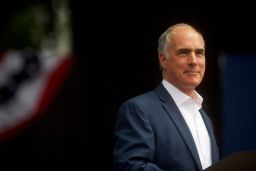
The Keystone State moves up several spots this month largely because of how uniquely settled the GOP primary is compared with other battleground states. Republicans coalesced around Dave McCormick to take on Democratic Sen. Bob Casey soon after the former hedge fund executive got into the race in late September. (State Sen. Doug Mastriano announced in May that he was passing on a bid – a major relief for national Republicans who were wary of the failed 2022 gubernatorial candidate and election denier.)
But Democrats think McCormick, who unsuccessfully sought the state’s other Senate seat last year, has his own baggage. He tried to tack to the right in an effort to secure Trump’s endorsement and the GOP nomination in the 2022 Senate primary, which could alienate some suburban Philadelphia voters in a general election. He’s also facing questions about his residency. McCormick insists that he lives in Pennsylvania but returns to Connecticut to visit his daughter, who’s still in school there and lives with his ex-wife. “And if there’s a political cost associated with that, so be it,” he recently told ABC27’s “This Week in Pennsylvania.”
Still, the combination of McCormick and his vast personal resources during a presidential year are likely to make this Casey’s most competitive Senate race yet. The three-term incumbent, who raised $3.2 million in the third quarter, has a well-known political name in the state and enjoys a 48% job approval (and 31% disapproval) rating, according to a Quinnipiac University poll released earlier this month. He led McCormick 50% to 44% among registered voters in that survey, but this race is still young.
5. Arizona
Incumbent: Independent Kyrsten Sinema
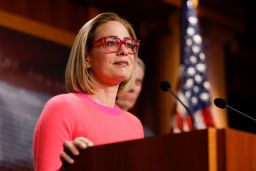
Kari Lake – who embraced election denialism and conspiracy theories in her losing 2022 gubernatorial bid – was far from Republicans’ dream Senate candidate in this emerging purple state. But the former TV anchor is going to be hard to beat in a primary given her strong connection with the GOP base. Trump endorsed her by video at her announcement rally earlier this month, and there are signs that the party establishment is trying to keep her close. “We have not ruled out endorsing Lake,” a source familiar with the NRSC’s strategy told CNN. Daines has said the national party has had “productive conversations” with Lake, who recently told The Associated Press she’d vote for McConnell for leader. She’s also picked up the backing of Senate GOP Conference Chairman John Barrasso.
But Lake still won’t admit she lost last year’s gubernatorial race and her past hard-line positions on abortion could turn off swing voters. Her candidacy represents a familiar challenge for Arizona Republicans, whose recent nominees for key offices swung right in the primary and then struggled to pivot to the general election. Pinal County Sheriff Mark Lamb is also running for Senate, but raised just $475,000 in the third quarter.
The race will remain unsettled, however, until Sen. Kyrsten Sinema, who left the Democratic Party to become an independent last year, announces whether she’s running. Her $825,000 haul in the third quarter raised questions about her future, given that it was less than what she’s raised in the past. But Sinema still had more than $10 million in the bank as of September 30. Democratic Rep. Ruben Gallego, meanwhile, outraised her yet again – bringing in $3.1 million last quarter – but had about half of her cash on hand.
6. Nevada
Incumbent: Democrat Jacky Rosen

Nevada is a slightly more Democratic state than most on this list, although that’s not saying much. It voted for Biden by about 2 points, so Democrats aren’t taking Sen. Jacky Rosen’s reelection for granted. She raised $2.7 million in the third quarter, ending with $8.8 million in the bank.
National Republicans have made clear their preference for retired Army Capt. Sam Brown, an unsuccessful 2022 Senate candidate who’s trying to tie Rosen to Biden and his economic policies. But that hasn’t winnowed the GOP field. Trump’s former ambassador to Iceland, Jeff Gunter, entered the race in August and has cut an ad that refers to him as “110% pro-Trump.” Retired Air Force Lt. Col. Tony Grady, who lost a GOP primary bid for lieutenant governor last year, also jumped into the race in August. Former state Assemblyman Jim Marchant, an election denier and the losing 2022 GOP nominee for Nevada secretary of state, only raised $74,000 last quarter, compared with $1.2 million for Brown.
The primary isn’t until June, but Democrats are already seizing on what they see as vulnerabilities in Brown’s abortion positioning, including comments he made during a 2014 run for the Texas state legislature and his past work with the Nevada Faith and Freedom Coalition.
7. Wisconsin
Incumbent: Democrat Tammy Baldwin
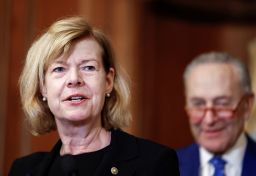
Wisconsin slides down one spot on this list, in part because Republicans still don’t have a major candidate to take on Democratic Sen. Tammy Baldwin. That doesn’t mean this race won’t eventually be very competitive in a battleground presidential state that swung from Trump to Biden in 2020.
Republicans are eyeing businessman and 2012 Senate candidate Eric Hovde, who would likely have the ability to self-fund. Baldwin raised $3.1 million during the third quarter and began October with about $6.9 million in the bank. This is one of the few states where presidential performance isn’t necessarily indicative of Senate race outcomes. GOP Sen. Ron Johnson, for example, won a third term last year after Biden had carried the state, albeit by only about half a point, two years earlier.
8. Michigan
Incumbent: Democrat Debbie Stabenow (retiring)

Michigan is a bluer state than its Midwestern neighbor Wisconsin – Biden carried the Wolverine State by nearly 3 points and Democrats saw success up and down the ticket in 2022, in part because abortion was such a galvanizing issue. Democrats are now trying to ensure that retiring Sen. Debbie Stabenow’s seat remains in their hands. Much of the party has coalesced around Rep. Elissa Slotkin, who raised nearly $3 million in the third quarter, although she does face primary challenges, including from actor Hill Harper, who raised about $559,000 and kicked in about $463,000 more of his own money.
Republicans landed a prominent recruit in former Rep. Mike Rogers, who succeeded Stabenow in the House and represented an earlier version of Slotkin’s Lansing-area seat for seven terms. Rogers, who raised $824,00 in the third quarter after entering the race in September, earned immediate praise from the NRSC as the “type of candidate who can perform well with suburban Michiganders.” And although the former House Intelligence chairman may use his recent absence from elected politics as a selling point, the GOP has changed a lot since he left Congress in 2015 – especially in Michigan, where the state party has a controversial new chair.
Since entering the race, Rogers has already landed a primary challenge from former Detroit Police Chief James Craig, who was disqualified from last year’s governor’s race over signature issues. Former Rep. Peter Meijer, who has formed an exploratory committee, could still run – although the one-term congressman isn’t likely to curry much favor with the GOP base after voting to impeach Trump in 2021.
9. Texas
Incumbent: Republican Ted Cruz
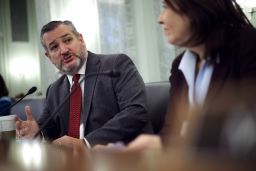
Texas is a hard state for Democrats to flip – they haven’t won a statewide election here since 1994, their longest losing streak in the country. But GOP Sen. Ted Cruz makes a good villain for national Democrat donors. (See Beto O’Rourke’s massive 2018 fundraising hauls in his closer-than-expected loss to the senator.)
The question, however, is whether that grassroots Democratic opposition to Cruz can translate widely enough to deny him a third term. Democratic Rep. Colin Allred, who has already proved to be a strong fundraiser, brought in $4.7 million in the third quarter – more than Cruz’s $3.1 million. Democrats tout the former NFL player’s background as a good fit for Texas – he first won election to the House by flipping a GOP-held district in the Dallas area and has previously won support from the US Chamber of Commerce.
But although Allred already appears focused on Cruz, he’ll have to get through a crowded primary first. Among the other candidates is state Sen. Roland Guttierez, who represents Uvalde and raised $632,000 in the third quarter.
10. Florida
Incumbent: Republican Rick Scott
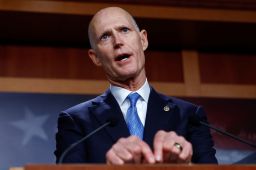
Former Democratic Rep. Debbie Mucarsel-Powell announced her campaign to take on GOP Sen. Rick Scott in late August. Despite only being in the race for part of the third quarter, she narrowly outraised the first-term senator and former governor – $1.5 million to $1.4 million. Scott gave his campaign an additional $154,000 of his own money, and there’s plenty more where that came from for the wealthy former health care CEO.
Florida has been trending red in recent years – Trump carried the state by about 3 points in 2020, nearly tripling his margin from four years earlier. But each of Scott’s races for governor and Senate have been relatively close, and he’s never run in a presidential year. Democrats have targeted him over some of his more unpopular policy proposals – such as a sunset provision for all federal programs, which he later revised to exclude Social Security and Medicare after criticism from within his own party. The Democratic Senatorial Campaign Committee, for example, has been running digital ads casting Scott and Cruz as threats to popular entitlement programs.
Even with Democratic investment, though, it’s going to take a lot to flip this seat blue. The state’s senior senator, Republican Marco Rubio, won reelection last year over a high-profile Democratic opponent by 16 points.

